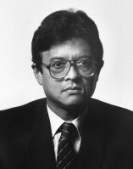 Amb. Razali Ismail of Malaysia, President of the fifty-first session of the General Assembly
"I would expect some of the countries of the North to be bold and courageous enough to say that they must take the necessary steps to meet the targets set in Rio and halt and reverse the decline of ODA." |
An urgent need to halt the decline of ODA, says Razali UNITED NATIONS, Apr 22 (G-77/IPS)- Ambassador Razali Ismail of Malaysia, president of the General Assembly, says the upcoming Special Session in June will re-examine the commitments made at the 1992 Earth Summit in Rio in the context of declining development assistance and the continuous degradation of the global environment. ‘’We want to know whether the commitments made in Rio are for real or do we have to forget them,’’ he said in an interview with the JOURNAL OF THE GROUP OF 77. Razali said there is an urgent need to halt the decline of Official Development Assistance (ODA). ‘’I would expect some of the countries of the North to be bold and courageous enough to say that they must take the necessary steps to meet the targets set in Rio and halt and reverse the decline of ODA,’’ he said. Asked if he had any particular countries in mind, Razali said he was specifically referring to the European countries. ‘’The European Union (EU) is the biggest player on development issues now. I would expect the European countries to take the lead,’’ he added. ‘’If other countries, like the U.S., are not willing to go along. That’s okay. Let us leave the U.S. aside. But the reluctance of one country should not prevent others from coming out and saying it,’’ he added. ‘’Political declarations of intent will not meet sustainable development objectives without concrete commitments on financial resources and the requisite institutions and instruments for implementation and monitoring,’’ he added. Razali also pooh-poohed the argument that ODA is fast become obsolete while the private sector could be a substitute for development assistance. ‘’No, that is not acceptable,’’ the General Assembly president said. It is only the donors who argue that ODA is not necessary. ‘’ODA is absolutely necessary’’, he said, adding that private sector resources cannot make up for the absence of ODA. ‘’We can use private sector resources if they are not selective and profit driven,’’ he added. Private sector is something governments can deal bilaterally. ‘’There is no way they will go into areas where there is no quick profit,’’ he added. Asked what could be the most important outcome of the Special Session, Razali said ‘’we should not concentrate our minds on one single thing.’’ ‘’The Special Session should be on every aspect of Agenda 21. They should include new sectoral issues, cross-sectoral issues, the future role of the Commission on Sustainable Development (CSD) and many others. It should be across-the-board examination of all the issues in Agenda 21. It would be unfair to deal with just one subject,’’ he added. The outcome of the Special Session should provide results that benefit both the developed and developing countries. Although domestic realities and priorities differ, ‘’I believe the major beneficiaries should be the poor— not necessarily just poor governments, but also marginalised peoples in the North and South who are frontline victims of unsustainable policies and practices.’’ Razali also said that the allegation that “environment” has captured more attention than “development” is justified. Instead of reverting to North-South trench politics, “we must seek a balance in the review and special session so that polarization between the agenda of the North and the agenda of the South is avoided.’’ Asked about the level of participation at the Special Session, he said many developing countries have indicated their willingness to participate at the highest political level. Meanwhile, many Third World diplomats say that the North-South partnership— painstakingly built at the Earth Summit in Rio de Janeiro— has been falling apart. Both rich and poor nations agreed in Rio to rehabilitate the global environment on the basis of shared responsibility. The flow of financial resources and the transfer of technology have not kept pace either with commitments or expectations. But the only additional resources generated so far is the two billion dollars pledged to the Global Environment Facility (GEF) administered jointly by the World Bank, the U.N. Development Programme (UNDP) and the U.N. Environment Programme (UNEP). In terms of the commitments made in Rio, the two billion dollars has been described by some as a drop in the ocean. The Group of 77 has last year accused Western donors of reneging on their promises to help save the world from ecological devastation. The commitment made by Western donors in Rio to provide ‘’new and additional resources’’ contrasts sharply with the decline in ODA to developing nations. At the Rio summit the Western donors, with the exception of the U.S., reaffirmed their commitment to the U.N. aid target of 0.7 percent of Gross National Product (GNP) set more than 20 years ago. The only five countries that have surpassed the target are Norway, Denmark, Sweden, Finland and the Netherlands. |